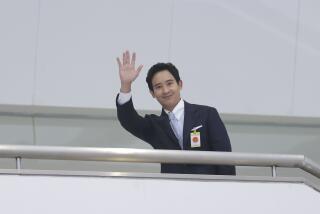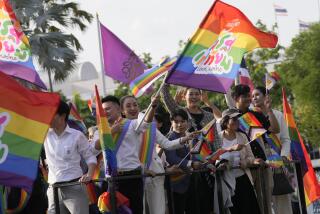Still bruised, Thais go to polls
- Share via
BANGKOK — Only one outcome appears clear as Thailand goes to the polls Sunday: the risk of violence no matter who wins.
A year after more than 90 people died in street protests and a bloody crackdown, much of the tension that exploded in a ritzy shopping district of Bangkok has barely been papered over in a country beset by vast social and economic disparities.
“Eventually, only some kind of a workable grand bargain can save Thailand from itself,” said Thitinan Pongsudhirak, a political science professor at Bangkok’s Chulalongkorn University. “It’s imperative to heal the wounds of conflict and confrontation.”
If anything, politicians have been poking those wounds rather than applying Band-Aids before the parliamentary elections, with the “clone” of divisive former Prime Minister Thaksin Shinawatra front and center in the drama.
Most recent polls predict victory for the populist Puea Thai party led by 44-year-old businesswoman Yingluck Shinawatra. She’s a blatant stand-in for Thaksin, her billionaire older brother who was ousted in a 2006 coup and is now in self-imposed exile to avoid prison on graft charges.
Thaksin, who’s calling most of the shots and footing the bills from Dubai, United Arab Emirates, has called her his “clone.” But as the country’s potentially first female prime minister, Yingluck has done surprisingly well campaigning in her own right. And the family name retains strong appeal among rural voters and the poor, who feel left behind in Thailand’s economic prosperity.
Slipping recently in popularity is the Democratic Party led by Prime Minister Abhisit Vejjajiva, which enjoys strong support among the monarchy, military, wealthy landholders and business class favoring the status quo.
Livening up the battle for the 500 seats in Thailand’s parliament, of which 375 are contested locally and 125 on the basis of nationwide party lists, is massage parlor kingpin Chuvit Kamolvisit.
Only someone who once paid the police $300,000 a month in bribes to keep his euphemistically named businesses going understands how to fight graft, the unlikely anticorruption folk hero argues.
Politicians “are like diapers: You have to change them,” the stocky, mustachioed Chuvit told the Associated Press. “Otherwise it’s too dirty.”
The controversial Thaksin, who won huge electoral victories with appeals to the disenfranchised only to see himself and his allies sidelined by judicial decisions, political rulings and military pressure, has had at least one lasting influence: populist freebies.
Political parties have tripped over themselves to outdo their opponents’ promises of largess from government coffers, including a million new jobs and computers for children, or pensions for all, credit cards for farmers and higher minimum wages.
“The important thing is whether these promises can be implemented, which is always contentious in Thailand,” said Supavud Saicheua, managing director with Bangkok’s Phatra Securities.
Speaking Friday to tens of thousands of supporters in the pouring rain at a final rally, political novice Yingluck pledged to wipe out poverty within nine years. “Just give this woman a chance to serve,” she said.
Meanwhile, at a campaign rally, Abhisit urged the crowd “to help get rid of the poison that is Thaksin” as a video of street violence and demonstrations played on oversized screens.
“Puea Thai policies are not sustainable,” said Prao Pan, a 28-year-old economics student. “They are just short-term stimulus.”
Abhisit opponents decry the English-speaking prime minister, often seen as aloof and effete. “He has done nothing in his years in office,” said Nawa Lee, a bus station clerk in Bangkok, who said she’d vote for anyone but Abhisit.
With so little trust between the pro-Thaksin camp, made up of farmers and urban poor, and the upper and middle classes backed by the army, there’s a significant threat of unrest.
“Thailand remains poised for further conflict in the immediate aftermath of the election regardless of who wins,” said Nicholas Farrelly, an Asia specialist at Australian National University. “There’s so much resentment and bad blood across the political and social spectrum that a single election cannot resolve matters.”
Adding to Thailand’s political instability is the health of King Bhumibol Adulyadej, 83, who has been in and out of the hospital for two years. Since he assumed the throne in 1946, Thailand has seen a score of prime ministers and nine coups.
More to Read
Sign up for Essential California
The most important California stories and recommendations in your inbox every morning.
You may occasionally receive promotional content from the Los Angeles Times.








